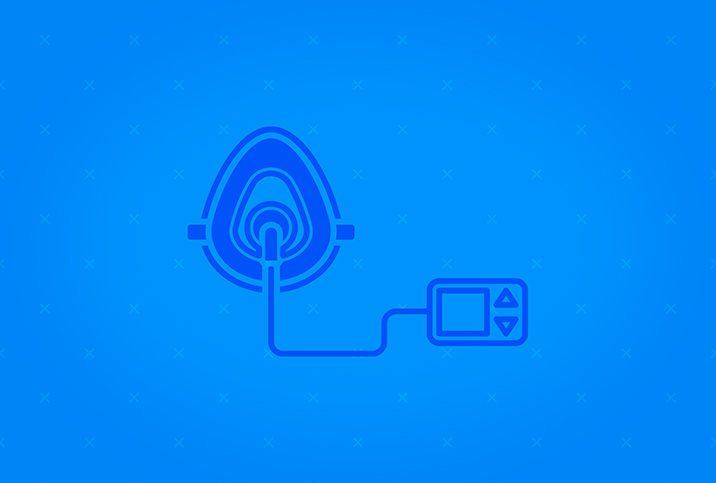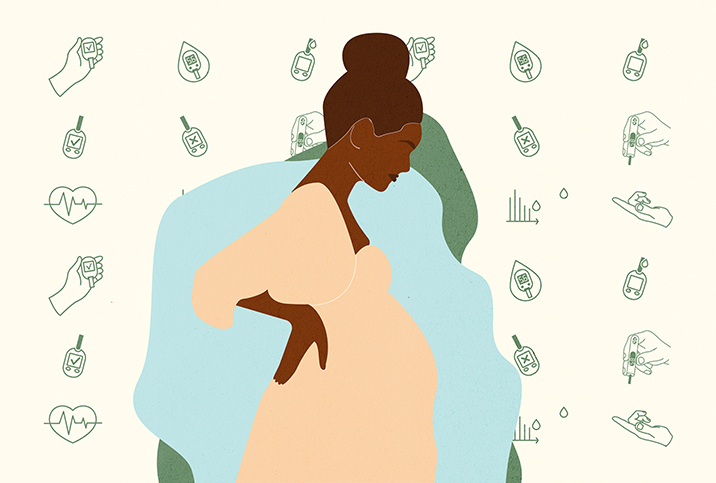Obstructive Sleep Apnea and Diabetes Go Hand-in-Hand

Every diabetic is familiar with the daily balancing act of monitoring and managing their blood sugar, the difficulty of which depends on the severity of the disease.
"It is important to know that you can live a long and healthy life by keeping your blood sugar levels in the target range set by you and your healthcare provider," said Pilar Inglesis, communications representative for Diabetes Canada. "If left unmanaged, the excess sugar in your blood can eventually cause problems and lead to serious health complications."
It sounds simple enough—monitor your blood glucose, get exercise and eat healthily. But what if your blood glucose is still out of control? Well, it turns out your sleep quality can impact your daily glucose levels as well.
"Diabetes and sleep apnea are best friends," stated Abhinav Singh, M.D., a fellow with the American Academy of Sleep Medicine and sleep medicine facility director at the Indiana Sleep Center. "Where there is diabetes, there is sleep apnea, and when someone with diabetes has sleep apnea, their condition is less manageable because their sleep apnea can cause a host of problems."
Understanding obstructive sleep apnea
The most common symptom of obstructive sleep apnea (OSA) is that the sufferer will stop breathing in the middle of sleep.
"Think of what happens when we use a flimsy straw to suck up a thick drink," Singh said. "When we try to bring in too much liquid, the straw collapses. This is the same thing that happens to your airway with sleep apnea."
He went on to explain that sleep apnea is caused by a triad of factors—genetics, weight and lifestyle choices. "The primary factor I have experienced is heredity," Singh explained. "I've met athletes, people in peak physical health, but who still have sleep apnea. In fact, one of the best things that happened for our profession was when Shaquille O'Neal told the world he has sleep apnea."
Perhaps the most startling aspect of sleep apnea is "of the 18 million people who have sleep apnea...up to 80 percent of people [go] undiagnosed," according to the National Institutes of Health. Even worse, Singh shared that 1 in 5 patients who are diagnosed are undertreated, or stop treatment. Devices like continuous positive airway pressure (CPAP) machines can be cumbersome and many patients are simply too embarrassed to use these devices around their partners.
Regardless of the causes of your sleep apnea, it's essential to seek treatment to prevent future impacts on your diabetes and the potential for other life-threatening conditions.
Continuing to avoid treatment for sleep apnea can have "serious complications, such as heart attack, glaucoma, diabetes, cancer, and cognitive and behavioral disorders," the National Heart, Lung and Blood Institute has stated.
Some sleepers don't realize they stop breathing, while others may gasp for air so violently that they awaken abruptly. Many times, the sufferer is unaware of how extreme their condition is. After all, snoring, while perhaps annoying to a light-sleeping partner, can't be all that bad, right?
Snoring on its own doesn't mean you have sleep apnea, but loud, wall-rattling snoring can be a sign of softening muscles in the throat and constricted airways. Even slight obstructions will impact your ability to breathe properly, your sleep patterns and, ultimately, your cardiovascular function.
According to the American Sleep Apnea Association, the average adult breathes between 12 and 16 times per minute. Someone with sleep apnea may experience fewer breaths, which causes the cardiovascular system to work harder as it tries to oxygenate the blood.
How sleep apnea impacts diabetes
It may seem odd that sleep patterns can impact diabetes, but when you consider that insomnia can impact our stress levels, mood and even brain function, it shouldn't come as too much of a surprise.
"The most simplistic way to explain is that when you stop breathing, your body releases adrenaline, essentially because it's trying to save your life," Singh said. "This increase in adrenaline causes your body to release stores of glucose to fuel your body during the fight-or-flight response."
While a one-time boost in glucose might not be a bad thing, consider how often a patient with sleep apnea might stop breathing over a long period of time. This response multiple times a night can create major impacts on your body chemistry and ultimately results in elevating your morning blood glucose level.
When to visit a sleep specialist
The idea that snoring can be dangerous doesn't even enter most people's minds, but understanding the possible risks should encourage you to talk with your doctor. While snoring on its own might not be a sign of sleep apnea, if you regularly experience fatigue, your glucose levels are erratic or you frequently wake up at night, these could all be signs of obstructive sleep apnea.
Your doctor will want to better understand your sleep patterns and observe your snoring, so you will likely be referred for a sleep study. While home sleep studies are gaining in popularity, your doctor may prefer a study performed in a clinic. You will be placed in a room where you will be expected to sleep while you are monitored by technicians. Painless electrodes will be placed on your head to record brain function, sleep patterns and stages of sleep.
This monitoring will help your doctor to understand your sleeping habits and how your breathing is impacted during various stages of sleep. There are many types of testing for sleep apnea, so it's important to discuss your symptoms in depth to help your doctor determine which tests will provide the most comprehensive results.
Sleep apnea treatments
There are many treatments available for sleep apnea, but the proper treatment will depend on the cause of your airway obstruction. For some patients, a combination of treatments may help to correct or manage your breathing.
Positive airway pressure (PAP) is one of the most common treatments. This treatment is administered while you sleep using a CPAP machine that blows air through a mask that is placed over your nose and mouth. Ideally, the increased airflow will help to keep your airway open to allow for continuous breathing while you sleep.
Secondary causes of sleep apnea can come from being overweight, as the increased body weight can create pressure on your chest, making it more difficult for the lungs to expand when you are asleep. While your doctor may still prescribe a CPAP machine, they may also recommend weight loss and lifestyle changes. In these instances, seeking the help of a licensed dietitian can help you to achieve your weight loss goals.
Regardless of the causes of your sleep apnea, it's essential to seek treatment to prevent future impacts on your diabetes and the potential for other life-threatening conditions. This may seem like a very obvious conclusion, but your body's ability to function properly is compromised when you cannot breathe and sleep effectively.

















